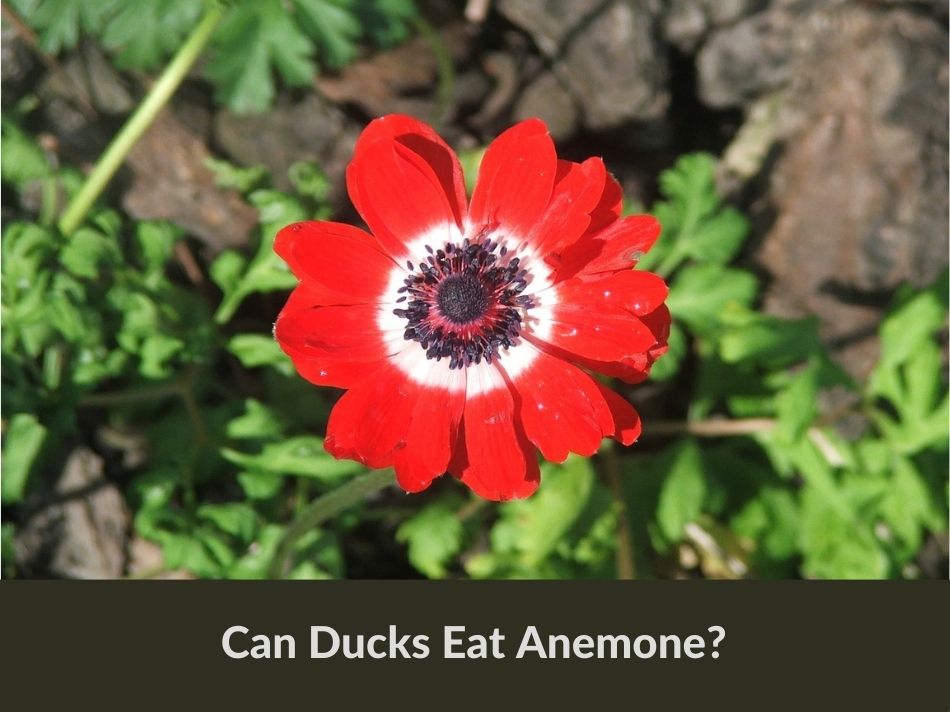Ducks are omnivorous birds that enjoy a varied diet. In the wild, they feed on a mix of aquatic plants, small fish, insects, and grains. Domestic ducks might also eat a blend of commercial feed, which is formulated to provide a balanced diet with all the necessary nutrients. But, can ducks eat anemone?
No, ducks should not eat anemone. Anemones can contain toxins that are harmful to certain animals, and there is no clear evidence to suggest that ducks can safely eat anemones. Therefore, it is not recommended to feed anemones to ducks, either in the wild or as pets.
In this concise article, readers can anticipate learning about the dietary habits of ducks, with a focus on whether anemones are a suitable addition to their diet.
What Are Anemone Flowers?
Anemone flowers, often referred to as “windflowers,” belong to the genus Anemone within the family Ranunculaceae. This genus includes about 120 species of flowering plants that are native to many temperate and subtropical regions of the world.
Anemones come in a variety of forms, but most are known for their delicate petals and vibrant colors, which can range from white, blue, and red to purple and pink. They are perennials, which means they can live for more than two years, and they typically have a period of dormancy before blooming again.
There are several types of anemones, including:
- Spring-flowering anemones: These are typically found in woodlands and include species like Anemone nemorosa (wood anemone) and Anemone blanda (Grecian windflower).
- Fall-flowering anemones: These are often taller species that bloom in late summer or fall, such as Anemone hupehensis (Japanese anemone) and Anemone x hybrida.
- Tuberous Mediterranean anemones: These include the popular Anemone coronaria, often grown for their showy flowers and used as cut flowers.
Anemone flowers have a simple, yet striking beauty and are popular in gardens and floral arrangements. However, they can also be sensitive to changes in their environment, and some species may be invasive in certain areas outside their native range. Additionally, it’s worth noting that anemones contain protoanemonin, a compound that can be irritating to the skin and toxic if ingested, so they should be handled with care.
Are Anemones Toxic To Ducks?
Anemone flowers contain protoanemonin, which is a toxic irritant compound that can be harmful if ingested by animals. While there is not a lot of specific information on anemones’ toxicity to ducks, it is generally advisable to prevent livestock and pets from ingesting plants that are known to be toxic to other animals.
Protoanemonin can cause gastrointestinal upset, and in larger quantities, it may lead to more serious health issues. Ducks, like other animals, may be susceptible to the toxic effects of this compound. Therefore, it would be prudent to keep ducks and other domestic animals away from anemone plants to prevent accidental ingestion.
If you suspect that your ducks or any other animals have ingested anemone plants, it is important to consult with a veterinarian or an animal poison control service immediately for advice specific to the situation.
Other Flowers Ducks Can Eat
Ducks can safely enjoy a variety of flowers as part of a balanced diet. Many common garden flowers are not only safe for ducks but can also provide them with additional nutrients. For instance, flowers like nasturtiums and marigolds are known to be duck-friendly and can even add a splash of color to their diet.
Below are some more flowers ducks can eat:
Make sure to see our thorough list of plants and flowers ducks can enjoy.
Conclusion
In summary, anemones are not a suitable food source for ducks or ducklings. The potential risks they pose far outweigh any perceived benefits. Caretakers and those who enjoy feeding ducks at parks should focus on providing a diet that consists of safe, nutritious foods that contribute to the health and well-being of these birds.
Disclaimer: The information in this article is for informational purposes only. I'm not an expert or a veterinarian.


